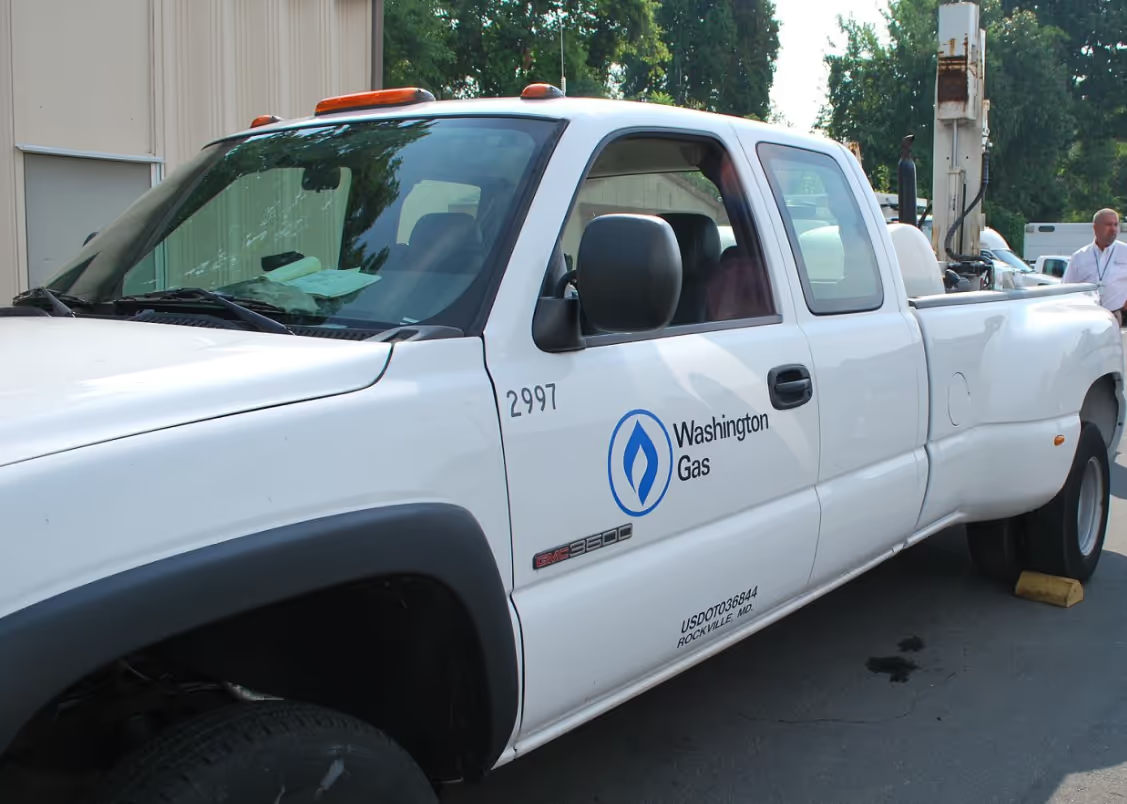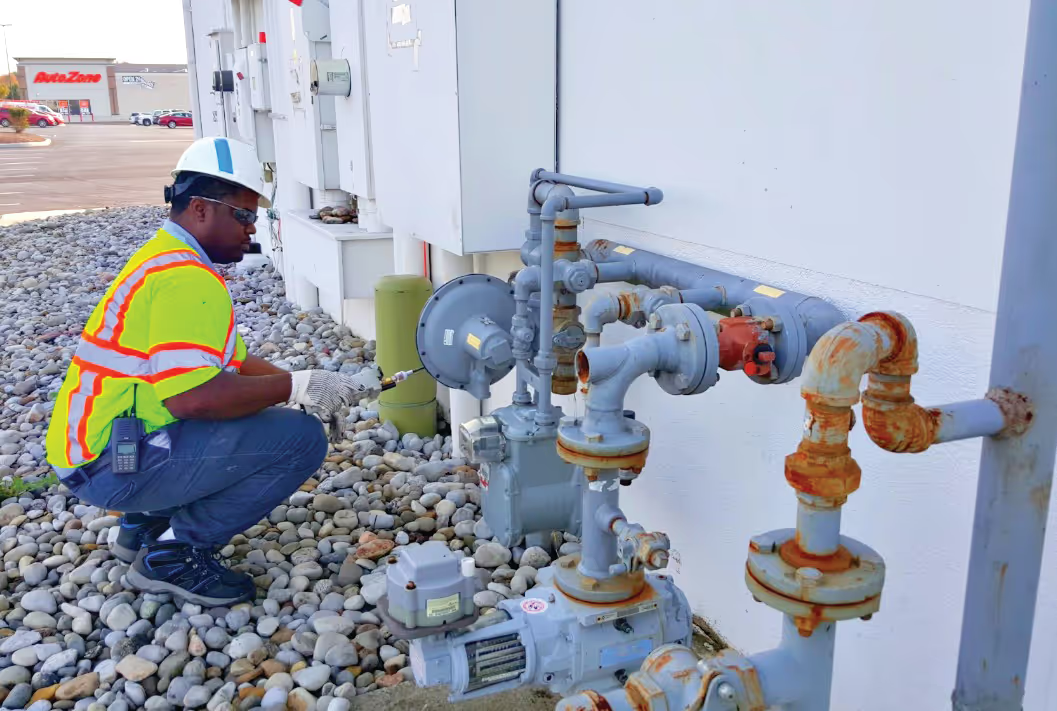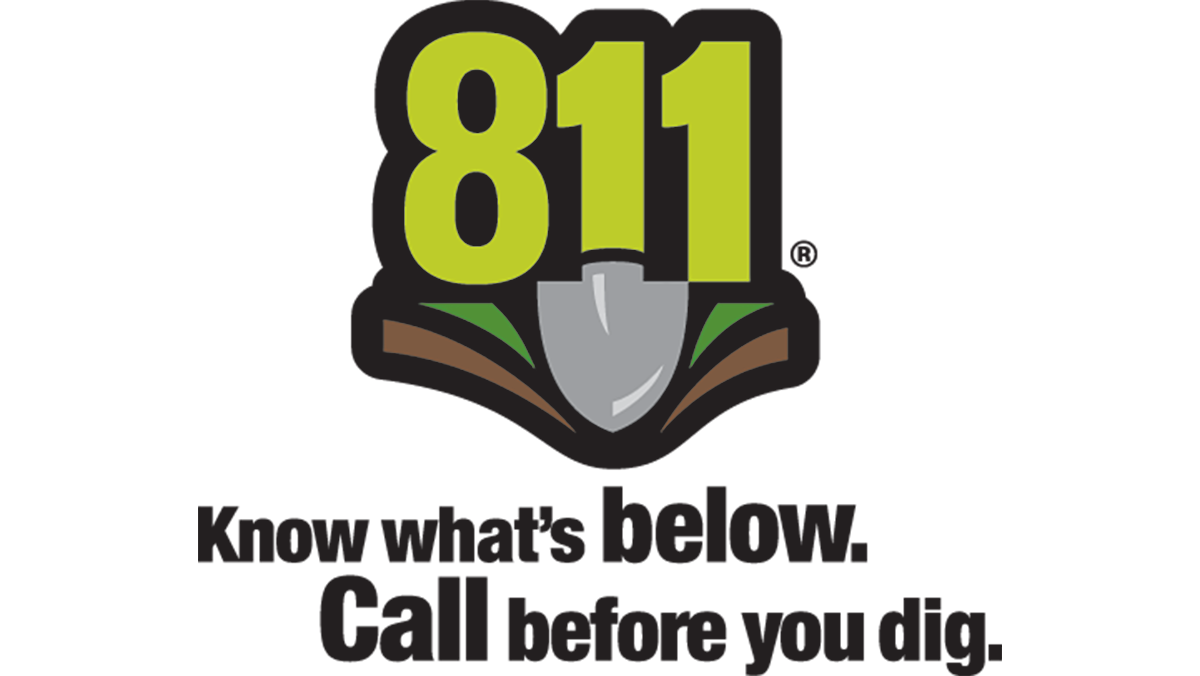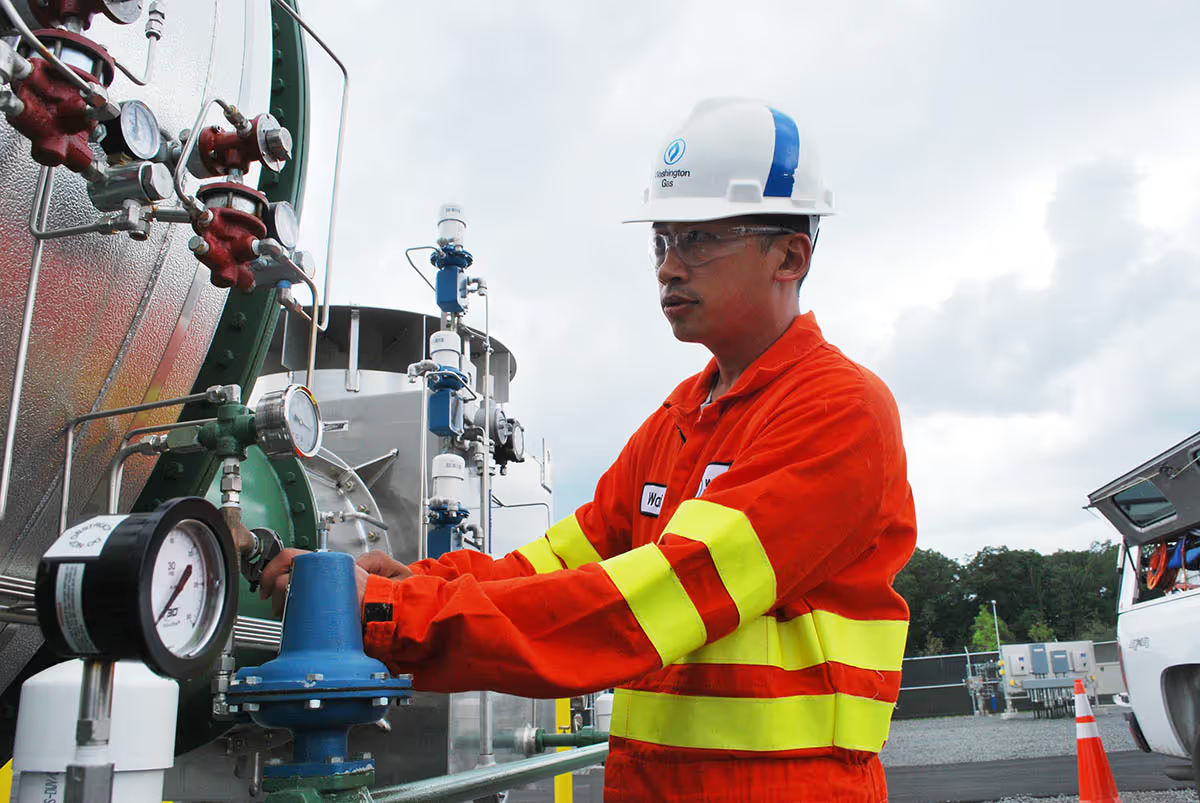
Natural Gas Safety
Natural Gas 101: Resources, Safety Tips & Emergency Information
Washington Gas is committed to delivering natural gas safely and reliably to our customers each and every day.
If you suspect a natural gas leak or other emergency:
RECOGNIZE:
Natural gas smells like sulfur, or rotten eggs. If you smell that, it may be a sign of a leak.
REACT:
Upon smelling natural gas, leave your building or location immediately.
RESPOND:
Call 911, and then the Washington Gas Emergency Leak Line at 844-WASHGAS (927-4427), selecting option 1. Emergency responders and Washington Gas will take action 24/7 to make sure you and the community stay safe.
Learn More About Natural Gas Safety:
- How to tell if there might be a gas leak
- What should I do if I think I smell natural gas?
- What happens when someone reports a smell of gas?
- What does Washington Gas do when it responds to investigate an odor complaint?
- How is natural gas leak assessed?
- Does Washington Gas have to shut off the gas to repair a leak?
- What are the common causes of damage to natural gas pipelines that lead to gas leaks or emergencies?
- How does Washington Gas maintain the safety and reliability of its system?
Natural Gas 101 answers all of your important safety questions about what to do if you think you smell gas and explains how we respond when you report a gas odor.
How to tell if there might be a gas leak:
The following can help determine if there could be a gas leak:
SMELL:
The most reliable sign of a natural gas leak is smell. Washington Gas adds an odorant called mercaptan to create the distinctive smell of sulfur or rotten eggs.
SIGHT:
Unexplained, random dead patch of lawn or vegetation in an otherwise green area of lawn or vegetation, unnatural bubbles in puddles and waterways (pond, creek, lake) or dirt being thrown in the air.
HEARING:
A hissing sound or blowing noises, typically accompanied by a gas odor.
What should I do if I think I smell natural gas?
While not all suspected gas odors are the result of an actual gas leak, this can only be determined by qualified personnel. If a person smells gas or hears the hissing of escaping gas, inside or outside a building:
DO
- Leave the area, leaving doors and windows open to ventilate if possible.
- Move to a safe location and call 911 and then call the Washington Gas Emergency Leak Line at 844-WASHGAS (927-4427), selecting option 1.
DON’T
- Smoke, or light a match, candle or other flame.
- Turn electrical appliances or lights on or off, operate motorized equipment or vehicles, or use any device that could cause a spark or source of ignition, including telephones and cell phones.
What happens when someone reports a smell of gas?
When the smell of natural gas is reported, Washington Gas dispatches trained and qualified technicians 24 hours a day, 7 days a week to investigate gas odor complaints and will not leave the site until the area is deemed safe.

What does Washington Gas do when it responds to investigate a gas odor complaint?
Regulations and standards state whether our crews repair the leak immediately or follow up with the repair at a later time. Here’s a look at the typical process:
- DETERMINE IF THERE IS A LEAK
Through the use of natural gas detection equipment, a technician will check the area to investigate for indications of natural gas. - LOCATE AND ASSESS
If gas is detected, the technician will continue their investigation in order to locate the area of the leak and where gas may be present. Using this information and other factors, the technician will determine if the leak poses a hazard. The technician will not leave until the area has been determined to be safe. - RESPOND
Safety is our top priority. If a leak poses a potential hazard, the technician will make sure the area is safe, and Washington Gas will conduct immediate repairs. Leaks determined to be non-hazardous will be scheduled for repair at a later date.

How is a natural gas leak assessed?
Because safety is our number one priority, every odor complaint is treated by Washington Gas with urgency.
Strictly adhering to federal guidelines, Washington Gas thoroughly evaluates, investigates and assesses all reported gas leaks, which typically fit into the following categories: non-hazardous and hazardous.
NON-HAZARDOUS:
After evaluation, a leak that is determined to be
non-hazardous will be monitored according to an appropriate schedule defined by Washington Gas until repaired. In between scheduled monitoring, the leak will be subject to reassessment pursuant to any additional complaints.
HAZARDOUS:
After evaluation, a leak that is determined to be an immediate hazard to persons or property will be immediately repaired or continuously monitored by highly trained onsite personnel until it can be repaired.
Federal requirements mandate that some non-hazardous leaks must be rechecked within six months and fixed within a year, but Washington Gas routinely completes these repairs more quickly.

Does Washington Gas have to shut off the gas to repair a leak?
Many leaks are repaired safely without shutting off the gas. If required to maintain safety to the public and our employees, Washington Gas will shut off the gas. When safety permits, Washington Gas plans any shut off to minimize disruption to our customers. The most common gas shut off methods are through using the many valves we have in the system, or in some cases simply squeezing off the pipe.
Techniques include:
- VALVES: Use of a series of valves to isolate the section of pipe being repaired.
- SQUEEZE OFF: Using a squeeze off tool to shut-off gas by ‘pinching’ or squeezing the polyethylene pipelines until gas flow stops. Many times this is done in conjunction with a valve to limit the amount of pipe and customers affected by the shutdown.
Washington Gas permanently repairs all leaks. If a permanent repair is not required immediately, a temporary repair is made until a permanent repair — or replacement — is scheduled. If repairs require the interruption of gas service, that service is only turned back on when the repair is complete. After restoration of service, customers’ appliances are relit by Washington Gas personnel or one of its contractors.
Repair procedures are in compliance with federal and state regulatory requirements and industry standards.
What are the common causes of damage to natural gas pipelines that lead to gas leaks or emergencies?
One of the leading causes of gas leak emergencies are damages to the underground gas lines by individuals and contractors performing excavation work, including digging, boring and directional drilling. We often refer to this kind of damage as a “third-party strike.”

The majority of these incidents are the result of not following the proper damage prevention protocols as established by the “Call Before You Dig” program, 811.
Anyone digging should call 811 at least two full working days — excluding weekends and holidays — before they are scheduled to begin any type of digging to report where they are planning to dig and what type of work they will be doing. Utility companies who may have facilities in the area of the dig site will be notified about the potential excavation. Each affected utility company will send a locator to mark the approximate location of the nearby underground utility lines. This service is free.
Using the 811 service properly helps to significantly reduce the risk of damage to underground utility infrastructure.
Pipelines can be damaged in a number of ways, including:

For more information about the "Call Before You Dig" program, click here.
How does Washington Gas maintain the safety and reliability of its system?
At Washington Gas, providing safe and reliable service to our customers is a priority. In fiscal year 2017, more than 99% of our customers experienced no unplanned outage of service.
We meet or exceed regulatory requirements in inspections and survey of our pipeline systems by:
- Completing a 100% leak survey of the entire underground system over a three-year period by qualified personnel who use sensitive and calibrated gas detecting equipment to identify and address leak indications.
- Conducting additional annual leak surveys over certain segments of the system in particular areas (such as business districts).
- Performing special surveys to identify damage and ensure system safety following extraordinary events that could potentially impact the system, such as earthquakes.
- Collecting and analyzing operating data to better direct maintenance and pipe replacement activities.
- Installing, inspecting and maintaining cathodic protection systems to guard the system’s steel pipelines from corrosion.
While performing their normal field activities, Washington Gas personnel and its contractors are trained and qualified to recognize and properly address any abnormal operating conditions of the pipeline system.

Additional Resources:
Other Signs of Natural Gas
Because gas traveling through a small portion of our transmission pipeline is not odorized, visible and audible signs of a possible leak are also described below.
Follow the same precautions if you:
- Are outside and smell gas
- Hear hissing or blowing noises
- See dirt being thrown into the air
- See fire coming from the ground or appearing to burn above ground
- See water bubbling or being blown into the air at a pond, creek or river
- See a dry spot in a moist field
- See dead or dying vegetation on or near a pipeline right-of-way
Indoor Air & Venting
Gas appliances and fireplaces use oxygen from the air to operate. When a home is sealed tightly, the oxygen inside can be used up and not replaced fast enough. The lack of air can cause incomplete burning, allowing carbon monoxide to form. Never enclose gas furnaces, water heaters or dryers in a closet or small room without providing openings for air circulation as required by local and state code.
Indoor air quality can be affected when the products of gas combustion are not vented properly. If your appliances require venting through metal pipes-- also known as flues-- a match test can be used to find out if your venting is effective. Once the burner is lit and operating normally, wait approximately 30 seconds and then hold a lighted match just below the flue-diverter on water heaters, furnaces and boilers.
If the flame leans towards you, flutters downward or goes out, the system is not drawing combustion particles outside through the vent or the flue. If you notice these signs, turn off the appliance, air out the building and call a licensed natural gas contractor immediately to inspect the equipment.
If the appliance is in an area with an attic fan, kitchen fan or bathroom fan, the fan can set up vent or flue back drafts. Have a licensed contractor check your venting.
Gas Migration
We distribute natural gas through a network of underground pipes and service lines. If a leak should occur, it is possible for gas to migrate into buildings, including those without natural gas service. Note: When calling us from another location to report a natural gas leak or other gas emergency at your home or business, please give the Emergency Leak Line representative the address or phone number where you can be reached, so we can gain unimpeded access to the house or building if necessary.
Gas Theft
Tampering with a natural gas meter is illegal and dangerous. The natural gas meter at your home -- whether located inside or outside -- belongs to Washington Gas. Call our Gas Theft Hotline at 703-750-4570 if you see suspicious activity involving a Washington Gas meter. The company offers rewards for verified reports of illegal piping connections or stolen meters. You may leave a recorded message with your name and other contact information, but you are not required to identify yourself unless you wish to be considered for the reward. Customers outside of the local calling area may dial 800-752-7520.
Natural Gas Safety:
- Mercaptan Scratch-And-Sniff Brochure (English & Spanish)
- Natural Gas Safety Fact Brochure (English)
- Natural Gas Safety Fact Brochure (Spanish)
- Pipeline Integrity
- Natural Gas Safety Advertisement
- Natural Gas 101 eBook
Damage Prevention: